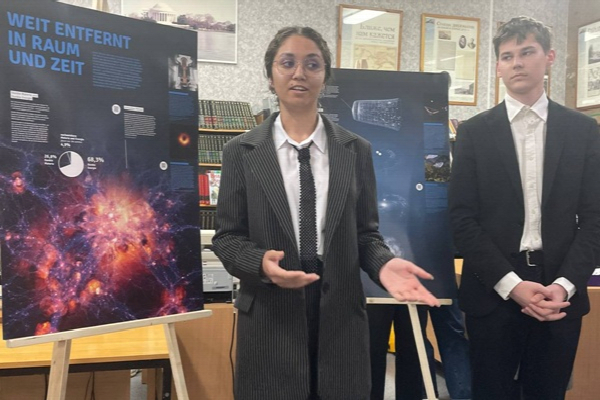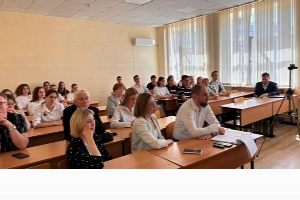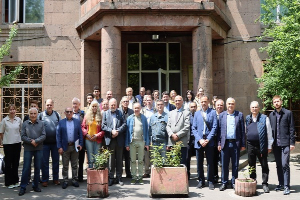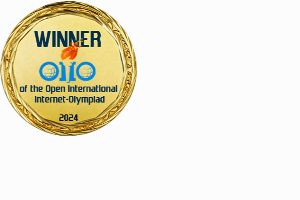
On May 21, the Don State Public Library hosted an exhibition and a lecture, which was attended by students of various fields of the Southern Federal University studying German.
"You are attending the opening of the poster exhibition today. It was organized and prepared by the Goethe-Institut together with the SFedU. It is especially gratifying that today not only the SFedU Institute of Philology, Journalism and Intercultural Communication students came, but also many departments of our university," Anna Lenets, Head of the Department of German Philology at the SFedU Institute of Philology, Journalism and Intercultural Communication, greeted the audience at the opening of the exhibition.
The exhibition consisted of five blocks, where students briefly talked about scientific discoveries that had been made in various fields.

The exhibition began with the theme "The Universe". In this block, Ksenia Konovalova, a 2nd-year student at the Faculty of Economics, Ekaterina Oleinikova and Amina Villanyushkina, 2nd-year students at the Academy of Architecture and Arts, Anton Shikharev, a 2nd-year student at the Faculty of Physics, talked about space and raised the following questions: "How big is the world? How does it arise? Is there life on Enceladus?"
Next, the topic "The History of mankind" was presented, where the path of the "modern man" was considered. Polina Gazukina and Victoria Fedorova, 2nd-year students of the Institute of History and International Relations, Alexander Sereda, 3rd-year student of the AAIU, Maxim Kurbatov and Igor Morozov, 3rd-year students of the Institute of International Relations, Ekaterina Voloshina and Rimma Tutova, 4th-year students of "Foreign Philology", Amelia Sinezskaya, 3rd-year student of the Academy of Biology and Biotechnology named after D.I. Ivanovsky, they told us that humanity originated in Africa, and from there Homo erectus spread to Europe and Asia. Today, scientists assume that Neanderthals could speak.

Now we are surrounded by many buildings, buildings ― a world that is already being created by man. This affects both climate and biodiversity. But is this enough to talk about the "era of man", the Anthropocene? The topic "Anthropocene" was revealed by Ilya Grigorenko, a 4th-year student of "Foreign Philology", Milana Avanesyan, Alexandra Stebliy and Polina Mordvinkova, 4th-year students of the department of Linguistics.
The brain is responsible for the world in our head. It was this topic that Vlad Dratov and Denis Ponomarev, 3rd-year students of Academy of Biology and Biotechnology, Inna Gurtovaya, a 2nd-year student at the Faculty of Economics, and Ksenia Brown, a 2nd-year student at the Academy of Psychology and Pedagogy, decided to address. There are countless conscious and unconscious processes going on in the human brain at every moment of time. As a result, the brain itself changes.
Artificial intelligence is currently taking over the world, and it is especially important to trace its impact on learning. To the questions: "What is artificial intelligence in general? How does it work?" — Yana Moskalenko, Kristina Shleikel and Maria Bykhalova, Sofia Egorova and Alla Pfefer, 4th-year students of Linguistics, tried to answer briefly.

At the end of the exhibition, the students attended a lecture by Evgeny Mukhanov, Vice Rector for Strategic Development and Research at SFedU, on the topic "From laboratories to legends or scientific networks as a new rock scene of the 21st century." In his lecture, he examined the connection between music and science, where he cited Albert Einstein as an example, who said: "If I wasn't a physicist, I probably would have become a musician. I often think in musical terms."
Next, the vice-rector examined the topic of science from different angles, drew a parallel between it and rock'n'roll, turned to the topic "Science as a cultural phenomenon," recalled popular science and feature films with the image of a scientist, and tried to answer the question: "Why do we need researchers?"

Short link to this page sfedu.ru/news/77954




